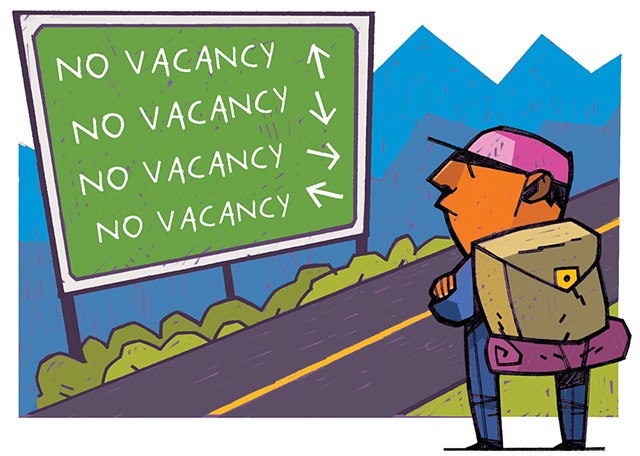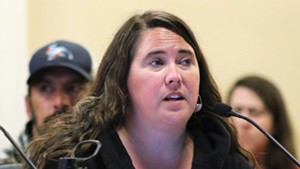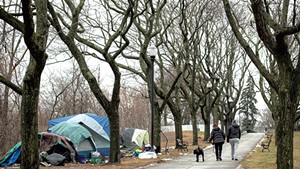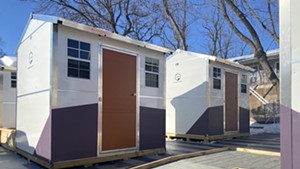
- Thom Glick
For years, Burlington officials have fielded near-daily complaints about the city's homelessness problem. Online forums and social media pages are rife with rants about people sleeping in business entryways, on benches, in city parks. At a recent city council meeting, a resident huffed that the city had "lost Church Street" to the unhoused.
The city has set up shelters and hired social workers, but the crisis has deepened — and could get worse. As many as several hundred people are expected to be evicted from the state's motel program by fall, starting next week. Many of those evictees will likely settle in Burlington.
Convinced that their city has borne the brunt of a homelessness crisis that extends far beyond its borders, Burlington officials have begun to seek help from surrounding towns through a mix of soft-sell diplomacy and commonsense economic arguments. While it remains unclear what those towns could do differently to ease the burden on Burlington, the state's largest city, cross-border tensions over homelessness are bound to loom over future debates about where or whether to create more shelter space in Chittenden County.
For some Burlington officials, frustrations are already building.
"One gentleman was hollering [at me] over email about all the unhoused in Burlington, and he was from Charlotte," City Councilor Sarah Carpenter (D-Ward 4) said. "I'm like, 'OK, what is your town doing?'"
In an effort to spur a regional discussion, the city last spring started hosting meetings of leaders around the county to discuss homelessness, but attendance has dropped off. At last month's session, only one official from another community — South Burlington Police Chief Shawn Burke, a former Burlington deputy chief — showed up.
"I would love to see a greater sense of accountability and advocacy from a regional level in our response to homelessness," Sarah Russell, the city's special assistant to end homelessness, said.
Nearly 300 people are sleeping rough in the greater Burlington area, up from about 50 just a year ago, according to city officials. A town-by-town count doesn't exist, but homelessness is most visible in Burlington.
In recent weeks, tents have popped up in several municipal parks, along the waterfront and behind Memorial Auditorium, despite a fence meant to secure the shuttered building.
The Queen City's image has suffered for it. Variations of "that's why I don't go downtown anymore" are common refrains among suburbanites whose towns have been relatively unaffected so far.
Neither the county nor state has a funded strategy to end homelessness, leaving the problem to towns and cities to answer on their own. In recent years, Burlington has added social workers, urban park rangers and a special assistant to end homelessness — Russell, who has the only such post in the state.
In 2020, the city helped open Vermont's first year-round, low-barrier shelter, and last year it installed 35 "shelter pods" to help people ease their way out of homelessness. Both are managed by local nonprofits, but the city has also run its own shelters, including a winter warming center at the former Veterans for Foreign Wars building on South Winooski Avenue. Of the county's 223 shelter beds, all but 28 of them are in Burlington.
"We've heard repeatedly that Burlington isn't doing enough," City Councilor Tim Doherty (D-East District) said at a city council meeting earlier this month. "But it seems, at least in this area, Burlington is essentially doing everything."
In some ways, it makes sense that Burlington would carry much of the burden. It is home to a major hospital, offers services for substance use and mental health, and hosts state offices where people can enroll in emergency housing programs. But to some Burlington officials, the idea that one city alone should confront the crisis ignores the fact that city and state economic fortunes are intertwined.
"It would be really good if other municipalities saw that they had a mutual interest in the vitality of one of our communities, in this case the biggest and the motor for the state," City Councilor Gene Bergman (P-Ward 2) said. "It's not in our interest to have a race to the bottom."
Leaders of those towns, however, insist that they have played a role. At various points, motels in Colchester housed 10 percent of the people enrolled in the state's emergency housing program, Town Manager Aaron Frank said. As a result, police calls to those motels jumped fivefold in a single year, from 2020 to 2021, town data show. Calls for emergency medical crews, which are staffed by volunteers, increased by about the same rate.
One such call came on a cold winter night when a pipe burst at the Motel 6 on South Park Drive, displacing dozens of people, including 36 in the state program, according to Frank. With no state workers on duty, town officials had to find other places for them to sleep.
"That was a very significant, severe impact on Colchester," Frank said of the motel program. "Other communities that don't have lower-priced hotels didn't have that." Burlington is one of them.
Officials in other surrounding towns said they're focused on longer-term solutions by supporting permanent housing projects for formerly homeless people. A total of 94 such units are planned or already have been built in Colchester, Shelburne, Williston and South Burlington as part of the growing portfolio of affordable housing developer Champlain Housing Trust. Selectboards in Shelburne and Williston each have waived more than $200,000 in fees to make those projects happen.
"This is a housing problem that we need to look at with housing supply all across the spectrum," said Matthew Lawless, Shelburne's town manager. "We have motels and long-range housing goals. This in-between spot [of homeless shelters] is tricky."
As part of the motel program's planned wind-down, Vermont lawmakers set aside $10 million to expand emergency shelters across the state. Any city, town or nonprofit can use the money to purchase an empty lot or convert an existing building into a shelter. Applications are due July 10, and those from Chittenden County will be considered highest priority.
But many of Burlington's closest neighbors — Colchester, Essex Junction, Shelburne, South Burlington and Williston — do not plan to apply. Officials in Hinesburg and Winooski didn't respond to requests for comment.
And after running its winter shelter at the VFW, Burlington isn't rushing to raise its hand, either. City officials haven't yet decided whether to apply for the funding.
Russell, Burlington's homelessness specialist, managed that shelter with one other city staffer and 10 temporary workers, putting in at least one overnight shift a week. Beyond the rigors of working with a challenging population under emergency conditions, Russell said she and her staff frequently had to place last-minute grocery orders and run to Costco for supplies. Russell's husband told her she couldn't bring the shelter's laundry home when its washer and dryer broke.
People want to feel safe in shelters, and "I think we achieved that," Russell said. "I just don't know if that's something that we have the internal infrastructure to continue to do."
Russell recognizes that smaller towns with even fewer resources may be unable to operate shelters. But they might have an empty parking lot or vacant building where a nonprofit group could open a shelter, particularly if state funds are available.
Burlington Mayor Emma Mulvaney-Stanak was to discuss the issue with town leaders and the Chittenden County Regional Planning Commission, one of the only county-level forms of government in the area.
Some officials seem to be listening, at least in Williston. Members of the town's housing committee recently discussed opening an emergency shelter, though the idea hasn't gained traction. The town manager, Erik Wells, is sketching out a proposal to create a community hub where social service providers could meet with clients. A social worker, embedded in the police department, would also work in the building.
Those plans might not become reality for years. The first motel departures are imminent.














Comments
Comments are closed.
From 2014-2020, Seven Days allowed readers to comment on all stories posted on our website. While we've appreciated the suggestions and insights, right now Seven Days is prioritizing our core mission — producing high-quality, responsible local journalism — over moderating online debates between readers.
To criticize, correct or praise our reporting, please send us a letter to the editor or send us a tip. We’ll check it out and report the results.
Online comments may return when we have better tech tools for managing them. Thanks for reading.